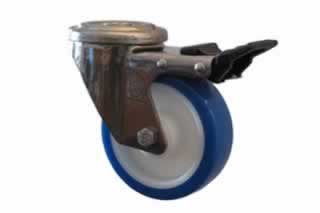
Casters play an important role in the food service industry. Consisting of wheels in a mountable frame, they are commonly found on food storage racks, commercial appliances, food prep tables, trash bins, workstations and more. If you’re looking to buy food service casters, however, there are several things you should consider.
Wheel Size
Some food service casters are bigger than others. Generally speaking, larger casters are better at navigating uneven surfaces, but they can raise the center of gravity on the equipment with which they are used. Smaller casters, on the other hand, are better suited for smooth surfaces or when moving delicate equipment.
Weight Capacity
Don’t forget to consider the weight capacity when choosing food service casters. If you’re planning to install them on heavy equipment, such as commercial appliances, you’ll need to ensure they can handle the added weight. You can refer to a caster’s weight capacity to determine how much weight it can safely handle.
Keep in mind that the weight capacity is “per caster,” so if you install four casters on a piece of equipment, you can multiply the weight capacity by four to get the total supported weight,
Common weight capacities for food service casters include the following:
- 165 pounds
- 190 pounds
- 220 pounds
- 240 pounds
Wheel Material
Food service casters are available in different materials. Some of them are made of steel or aluminum, whereas others are made of softer materials like rubber or polyurethane. Softer materials offer better shock absorption, making them ideal for casters on storage carts and other moveable equipment. Hard materials like aluminum and steel, on the other hand, offer a superior level of durability.
Swivel vs Fixed
Food service casters are available in swivel and fixed styles. Fixed casters can only roll forward and backward. Swivel casters, in comparison, can roll in all directions. If you’re planning to use them in tight spaces, such as around corners and through hallways, you may want to choose swivel-style food service casters for this reason.
Brakes
Some food service casters have brakes. With this feature, you can immobilize them so that they don’t roll unintentionally. Brakes work by locking the wheels in place. To roll them again, you’ll have to disengage the brakes.
Heat and Moisture Resistance
You should consider heat and moisture resistance when choosing food service casters. Heat and moisture are common in restaurants and other food service businesses. Over time, exposure to these elements can degrade certain products and equipment. Fortunately, there are food service casters available that can withstand heat and moisture.
